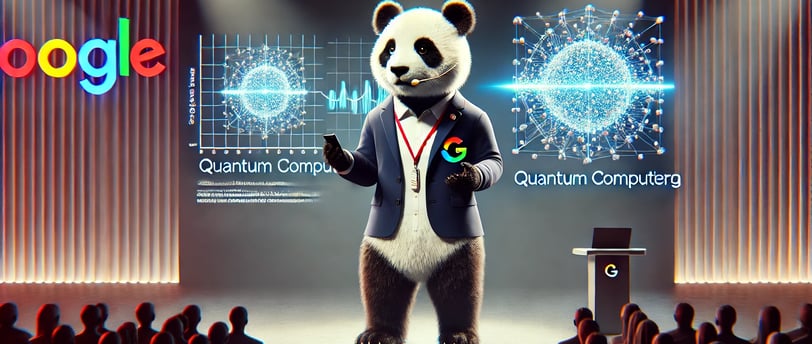Quantum Computing's New Frontier: Inside Google's Race to Redefine What's Possible
Discover how Google’s quantum computer has revolutionized computing, achieving double exponential growth with its latest Willow chip. Learn about its future potential and challenges ahead.
Dr.Pan
12/10/20243 min read


In the rapidly evolving world of quantum computing, Google has emerged as a pioneering force, marking significant milestones that continue to reshape our understanding of computational possibilities. While separating hype from reality can be challenging, let's explore the remarkable progress and realistic potential of Google's quantum computing initiatives.
The 2019 Breakthrough: Understanding Quantum Supremacy
Google's 2019 achievement with their 53-qubit Sycamore processor represents a genuine watershed moment in computing history. The team demonstrated what they termed "quantum supremacy" by performing a specific sampling task in approximately 200 seconds – a computation they initially estimated would take thousands of years on classical supercomputers. This accomplishment, published in Nature, sparked both excitement and healthy scientific debate within the computing community.
However, it's crucial to understand the nuance behind this achievement. While impressive, the task was highly specialized and designed to showcase quantum advantage rather than solve practical problems. IBM, another quantum computing leader, argued that classical computers could potentially solve the same problem much faster than Google's initial estimate, highlighting the ongoing dialogue about how we benchmark quantum versus classical performance.
Beyond Quantum Supremacy: The Current State of Play
The quantum computing field has evolved significantly since 2019, with researchers now preferring the term "beyond classical" over "quantum supremacy." This shift reflects a more nuanced understanding of the relationship between quantum and classical computing capabilities. Rather than viewing them as competitors, the scientific community increasingly sees them as complementary technologies, each with unique strengths and applications.
The Real Challenges in Quantum Computing
The path toward practical quantum computers faces several fundamental challenges that deserve honest discussion:
Error Correction and Quantum Coherence
Perhaps the most significant hurdle in quantum computing is maintaining quantum coherence while correcting errors. Quantum states are incredibly fragile, and environmental noise can cause qubits to lose their quantum properties (decohere) before calculations complete. Current quantum computers operate in what we call the NISQ era (Noisy Intermediate-Scale Quantum), where errors limit both the scale and duration of possible computations.
Scaling Up: The Path to Logical Qubits
The quantum computing community's goal of achieving 1,000 logical qubits represents an enormous technical challenge. A logical qubit requires multiple physical qubits working together with error correction, potentially requiring thousands of physical qubits to create a single reliable logical qubit. This scaling challenge explains why progress toward larger quantum computers has been steady but measured.
Practical Applications: Separating Promise from Hype
While quantum computing shows enormous potential, it's important to be realistic about timeframes and applications. Several fields stand to benefit significantly from quantum computing advances:
Drug Discovery and Materials Science
Quantum computers could revolutionize how we simulate molecular interactions, potentially accelerating drug discovery and materials development. However, achieving practical quantum advantage in these areas requires significant advances in both hardware and algorithms.
“🌅 TAKE CONTROL OF YOUR FUTURE: Discover How AI Helps You Quit the 9-5 and Create a Life You Love!”
Financial Modeling
The finance sector has shown keen interest in quantum computing's potential for portfolio optimization and risk analysis. Yet, these applications require fault-tolerant quantum computers that are still years away from realization.
Looking Ahead: Realistic Expectations
Rather than focusing on specific timeline predictions, it's more valuable to understand that quantum computing development will likely follow a gradual progression. Each advance builds upon previous work, with improvements in areas like error correction, qubit coherence times, and algorithm development all contributing to overall progress.
Conclusion
Google's achievements in quantum computing represent genuine scientific progress that deserves celebration. However, the path forward requires patience, continued investment, and honest discussion about both the potential and limitations of this technology. As we move forward, maintaining a balanced perspective – one that acknowledges both the extraordinary possibilities and significant challenges – will be crucial for the field's healthy development.
The quantum computing revolution isn't about dramatically outpacing classical computers in every domain but rather about opening new computational possibilities that were previously unthinkable. As we continue to push the boundaries of what's possible, the most exciting developments may be ones we haven't even imagined yet.
Unlock the best deals, coupon codes, and exclusive announcements from your favorite brands – all in one place. Stay informed with up-to-date stories, expert tips, and special offers tailored just for you.
✨ Why Join?
✔ Break Through Mental Blocks: Get expert tips to boost your mindset.
✔ Exclusive Deals & Discounts: Never miss a money-saving coupon or promo.
✔ Stay in the Know: Be the first to hear about new products, events, and insider updates.
📬 Sign Up Now – It’s free, easy, and your all-access pass to what matters most!
© 2024. All rights reserved.
